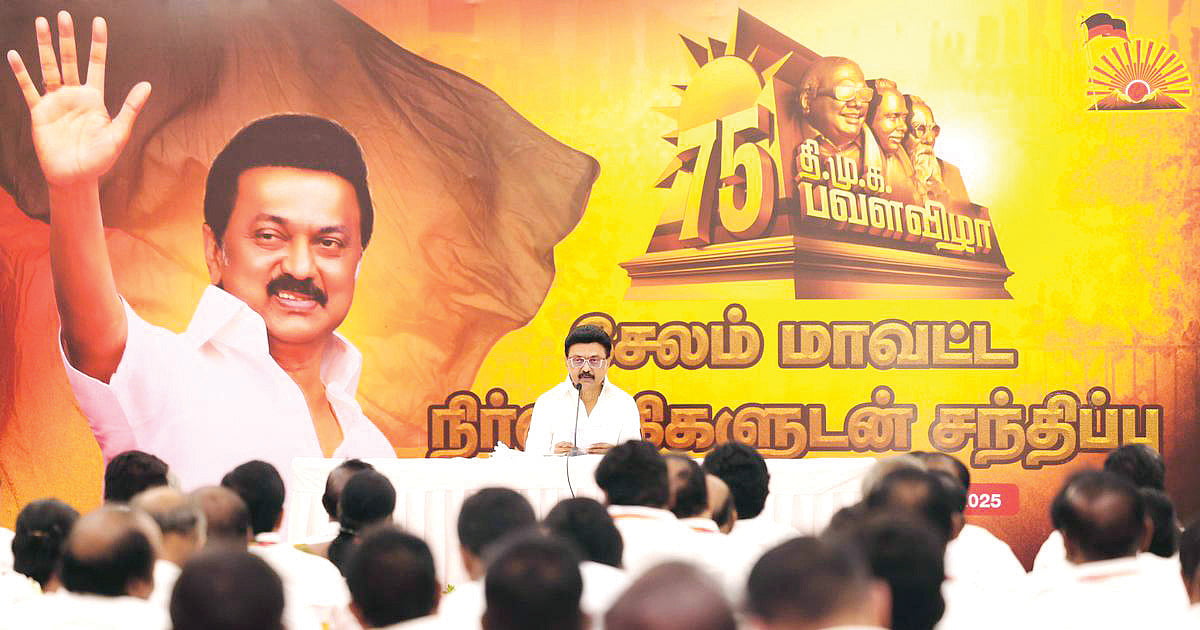Tamil Nadu sees red as SIRcus rolls in
With floods, festivals and migrations, thousands of genuine voters are at risk of being left out of the SIR exercise

On 27 October, when the Election Commission of India (ECI) announced that Tamil Nadu would be included in the second phase of its special intensive revision of electoral rolls (SIR 2.0), it was presented as a routine procedure. But DMK-ruled Tamil Nadu saw red.
On 2-3 November, 45 parties, including the Congress, CPI, CPI(M), VCK, MDMK, IUML and several regional and Dalit outfits, gathered under the portraits of Periyar and Anna at the Tamil Nadu secretariat in Chennai. Chief minister M.K. Stalin’s words carried the emotional charge of history. “This is not revision, it’s erasure, it’s political engineering through paperwork.”
Twelve states and Union Territories are listed as part of SIR 2.0 before the next election cycle. Assembly elections are due in Tamil Nadu in April/May 2026.
The all-party meeting ended with a resolution to file a petition against the ECI in the Supreme Court. The tone was unmistakably Dravidian, proud and combative, recalling another era, when state leaders had resisted Hindi imposition, Delhi’s fiscal diktats and national education policies that ignored linguistic diversity.
Away from the marble corridors of the state secretariat, monsoon rains lashed the coast. In Nagapattinam’s fishing hamlets, enumerators in raincoats trudged through slush, tablets wrapped in polythene, ticking names.
Confusion reigned in Chennai’s slums and Tiruppur’s migrant quarters. “They came last week and asked for Aadhaar,” said N. Rajeswari, a civic volunteer in north Chennai. “Now they say Aadhaar is not required. People don’t know what to believe.”
In Cuddalore’s coastal belt, panchayat member S. Pandyan voiced a simpler fear: “If they come when we are at sea, they will mark our house locked. Then they will say we don’t exist.” For fisherfolk, daily-wage workers and internal migrants, enumeration is no abstraction — it decides whether their names will appear on the list that gives them a voice in governance and entitles them to state benefits.

The DMK’s argument pivots on the gap between process and lived reality. With floods, festivals and migrations, thousands of genuine voters are at risk of being left out of the SIR exercise. “The timing is critical… This is how voter suppression works,” DMK national spokesperson Salem Dharanidharan told National Herald.
The ECI’s response is deadpan: “No state can exempt itself from due process,” said one senior official in Chennai. “Accuracy is our first duty.” The Commission aims to publish final rolls by February 2026, possibly a month before the polls are announced.
The Dravidian compass
To understand Tamil Nadu’s reaction, one must look beyond electoral arithmetic. The DMK’s outrage is rooted in history. The Dravidian movement that birthed the DMK came out of a struggle against northern dominance — of caste, language and state power.
In the early 20th century, the Justice Party, a forerunner of the Dravidian parties, challenged Brahminical monopoly in education and administration. Periyar’s ‘Self-Respect Movement’ pitched it as a battle for rationalism against superstition, hierarchy and cultural homogenisation.
When Hindi was sought to be imposed as India’s national language in the 1930s and again in the 1960s, Tamil Nadu erupted. Students filled the streets, and lives were lost in protest. The slogan then was ‘Down with Hindi, long live Tamil!’ It was not really hatred of another language but a defence of self-rule — the belief that decisions of life and lifestyle should not be dictated from elsewhere.
That same sentiment animates today’s resistance to SIR 2.0 — it’s a visceral response to the ECI’s social re-engineering at the behest of its political masters.
In the lanes of Villupuram and the bylanes of Tirunelveli, enumerators knock on doors with digital tablets. They are met with suspicion. “They ask our names, our Aadhaar, our age,” said 68-year-old Ramasamy of Saidapet. “Last time, my brother’s name was deleted. We fought for months to get it back. This time, I have kept all documents ready. But I don’t trust them.”
Civic groups have stepped in where the state cannot. The People’s Union for Civil Liberties (PUCL) and local election monitoring forums have begun pamphlet campaigns.
“People fear Delhi’s hand,” said one activist in Coimbatore. The mistrust is less paranoia and more survival instinct. Tamil Nadu’s working classes remember the NRC (National Register of Citizens) controversies in the Northeast. They remember Aadhaar-linked welfare schemes gone wrong.
The BJP dismisses the DMK’s campaign as ‘manufactured outrage’. “Every ruling party demands clean rolls when out of power and cries foul when in power,” a senior BJP leader said in Chennai. “This is political theatre.”
The AIADMK, caught between its Dravidian lineage and its alliance with the BJP, has chosen ambiguity. “People are tired of the constant Centre-State fights,” said one spokesperson. “They want governance, not grandstanding.”
On 3 November, the DMK submitted a petition in the Supreme Court challenging the constitutional validity of the ECI’s 27 October notification, extending SIR to Tamil Nadu and 11 other states/UTs. It argues that the SIR, which got under way on 4 November, violates Articles 14, 19, 21, 325 and 326 of the Constitution, as well as the Representation of the People Act, 1950.
The petition flags arbitrary document requirements, short timelines and the risks of disenfranchising lakhs of voters, especially from marginalised groups. The DMK has called the SIR a ‘de facto NRC’.
For Stalin, the courtroom is just one arena. The larger battle is ideological — to project the DMK as the guardian of Tamil Nadu’s federal dignity. His rallies now mix legal grievance with cultural memory: “We resisted language control, we resisted education control, and now we must resist ballot control.”
Follow us on: Facebook, Twitter, Google News, Instagram
Join our official telegram channel (@nationalherald) and stay updated with the latest headlines
